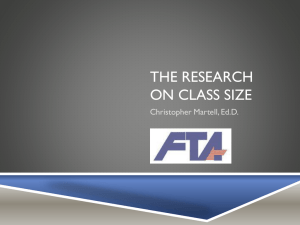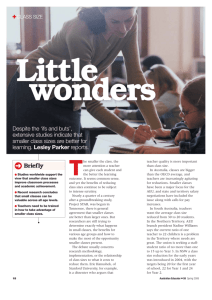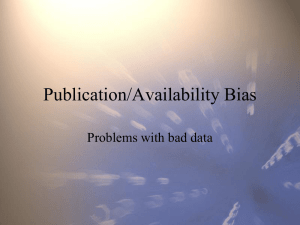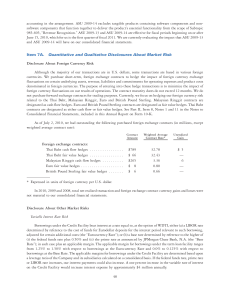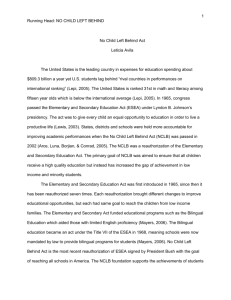SPYROS KONSTANTOPOULOS Curriculum Vitae Address:
advertisement
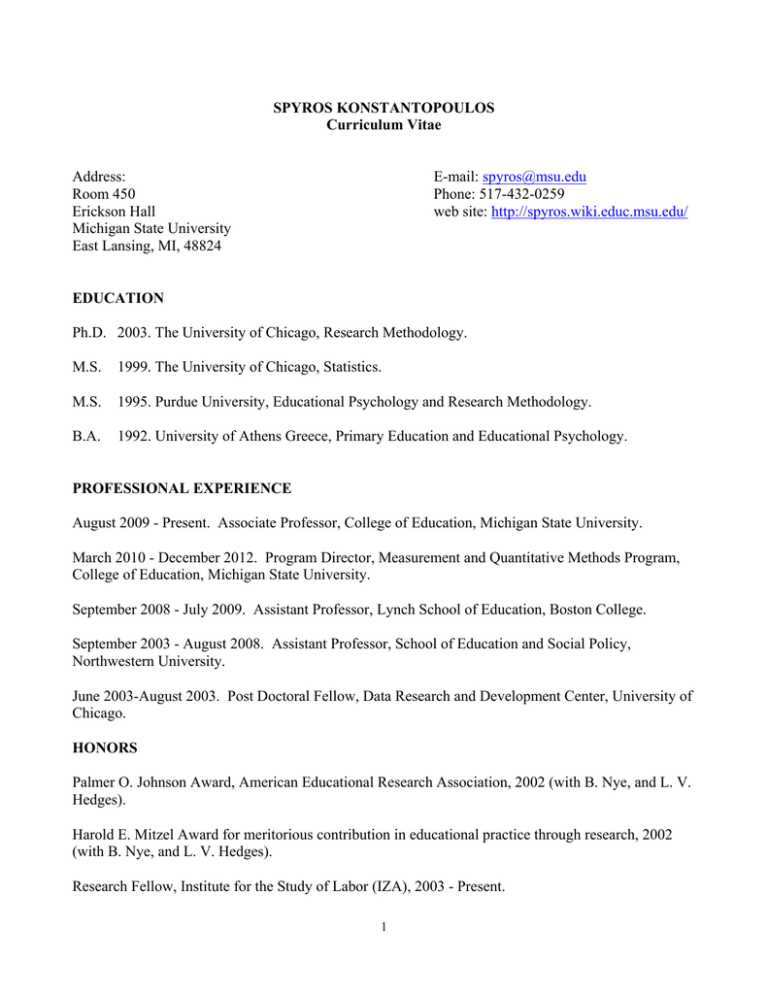
SPYROS KONSTANTOPOULOS Curriculum Vitae Address: Room 450 Erickson Hall Michigan State University East Lansing, MI, 48824 E-mail: spyros@msu.edu Phone: 517-432-0259 web site: http://spyros.wiki.educ.msu.edu/ EDUCATION Ph.D. 2003. The University of Chicago, Research Methodology. M.S. 1999. The University of Chicago, Statistics. M.S. 1995. Purdue University, Educational Psychology and Research Methodology. B.A. 1992. University of Athens Greece, Primary Education and Educational Psychology. PROFESSIONAL EXPERIENCE August 2009 - Present. Associate Professor, College of Education, Michigan State University. March 2010 - December 2012. Program Director, Measurement and Quantitative Methods Program, College of Education, Michigan State University. September 2008 - July 2009. Assistant Professor, Lynch School of Education, Boston College. September 2003 - August 2008. Assistant Professor, School of Education and Social Policy, Northwestern University. June 2003-August 2003. Post Doctoral Fellow, Data Research and Development Center, University of Chicago. HONORS Palmer O. Johnson Award, American Educational Research Association, 2002 (with B. Nye, and L. V. Hedges). Harold E. Mitzel Award for meritorious contribution in educational practice through research, 2002 (with B. Nye, and L. V. Hedges). Research Fellow, Institute for the Study of Labor (IZA), 2003 - Present. 1 Konstantopoulos Member of the Society for Research Synthesis Methodology, 2005 - Present. Faculty Associate at Institute of Policy Research at Northwestern University, 2004-2008. Education Policy Center Faculty Associate (Michigan State University) 2010 - Present EDITORIAL EXPERIENCE Editor: Methods Section, Journal of Research on Educational Effectiveness January 2013 - Present Associate Editor: Methods Section, Journal of Research on Educational Effectiveness January 2011 December 2012 Associate Editor, Research Synthesis Methods January 2010 - December 2012 Editorial Board, Research Synthesis Methods January 2009 - December 2010, January 2013 - Present Editorial Board Educational Evaluation and Policy Analysis 2012 - 2015 Editorial Board, Educational and Psychological Measurement 2011 - Present Editorial Board, International Journal of Quantitative Research in Education 2012 - Present Editorial Board, ISRN Education 2011 - Present Editorial Board, Sociology of Education 2006 - 2009 PUBLICATIONS Articles in Peer Review Journals 1999 1. Nye, B., Hedges, L.V., & Konstantopoulos, S. (1999). The long-term effects of small classes: A five-year follow-up of the Tennessee class size experiment. Educational Evaluation and Policy Analysis, 21, 127-142. 2000 2. Nye, B., Hedges, L.V., & Konstantopoulos, S. (2000). Effects of small classes on academic achievement: The results of the Tennessee class size experiment. American Educational Research Journal, 37, 123-151. 3. Nye, B., Hedges, L.V., & Konstantopoulos, S. (2000). Do the disadvantaged benefit from the small classes? Evidence from the Tennessee class size experiment. American Journal of Education, 109, 1-26. 2001 4. Nye, B., Hedges, L.V., & Konstantopoulos, S. (2001). The long-term effects of small classes in early grades: Lasting benefits in mathematics achievement at grade nine. Journal of Experimental Education, 69, 245-257. 5. Nye, B., Hedges, L.V., & Konstantopoulos, S. (2001). Are the effects of small classes cumulative? Evidence from the Tennessee class size experiment. Journal of Educational Research, 94, 336-345. 6. Konstantopoulos S., Modi, M., & Hedges L.V. (2001). Who are America’s gifted? American 2 Konstantopoulos Journal of Education, 109, 344-382. 2002 7. Nye, B., Hedges, L.V., & Konstantopoulos, S. (2002). Do low achieving students benefit more from small classes? Evidence from the Tennessee class size experiment. Educational Evaluation and Policy Analysis, 24, 201-217. 2003 8. Constant, A., & Konstantopoulos, S. (2003). School effects and labor market outcomes for young adults in the 1980s and 1990s. Applied Economics Quarterly, 49, 5-22. (names are listed alphabetical, equal authorship) 2004 9. Nye, B., Konstantopoulos, S., & Hedges, L.V. (2004). How Large are Teacher Effects? Educational Evaluation and Policy Analysis, 26, 237-257. 10. Nye, B., Hedges, L.V., & Konstantopoulos, S. (2004). Do minorities experience larger lasting benefits from small classes? Evidence from a five-year follow-up of the Tennessee class size experiment. Journal of Educational Research, 98, 94-100. 2006 11. Konstantopoulos, S. (2006). Trends of School Effects on Student Achievement: Evidence from NLS:72, HSB: 82, and NELS:92. Teachers College Record, 108, 2550-2581. 2008 12. Konstantopoulos, S. (2008). The power of the test for treatment effects in three-level cluster randomized designs. Journal of Research on Educational Effectiveness, 1, 66-88. 13. Konstantopoulos, S., & Hedges, L. V. (2008). How Large an effect can we expect from school reforms? Teachers College Record, 110, 1613-1640. 14. Konstantopoulos, S. (2008). Do small classes reduce the achievement gap between low and high achievers? Evidence from Project STAR. Elementary School Journal, 108, 275-291. 15. Konstantopoulos, S., & Constant, A. (2008). The gender gap reloaded: Are school characteristics linked to labor market performance? Social Science Research, 37, 374-385. 16. Konstantopoulos, S. (2008). Computing power of tests for the variability of treatment effects in designs with two levels of nesting. Multivariate Behavioral Research, 43, 327-352. 17. Konstantopoulos, S. (2008). The power of the test for treatment effects in three-level block randomized designs. Journal of Research on Educational Effectiveness, 1, 265-288. 2009 18. Konstantopoulos, S. (2009). The mean is not enough: Using quantile regression to examine trends in Asian-White differences across the entire achievement distribution. Teachers College Record, 111, 1274-1295. 19. Konstantopoulos, S. (2009). Using Power Tables to Compute Power in Multilevel Experimental Designs. Practical Assessment Research and Evaluation, 14(10), 1-9. 20. Konstantopoulos, S. (2009). Incorporating Cost in Power Analysis for Three-Level Cluster 3 Konstantopoulos Randomized Designs. Evaluation Review, 33, 335-357. 21. Konstantopoulos S. (2009). Effects of teachers on minority and disadvantaged students' achievement in the early grades. Elementary School Journal, 110 (1), 92-113. 22. Konstantopoulos S., & Chung, V. (2009). What are the long-term effects of small classes on the achievement gap? Evidence from the Lasting Benefits Study. American Journal of Education, 116 (1), 125-154. 2010 23. Konstantopoulos, S. (2010). Power Analysis in Two-Level Unbalanced Designs. Journal of Experimental Education, 78, 291-317. 24. Kanter, D., & Konstantopoulos, S. (2010). The impact of project-based science on minority student achievement, attitudes, and career plans: An examination of the effects of teacher content knowledge, pedagogical content knowledge, and inquiry-based practices. Science Education, 94, 855-887. 2011 25. Konstantopoulos, S., & Borman, G. D. (2011). Family background and school effects on student achievement: A multilevel re-analysis of the Coleman data. Teachers College Record, 113, 97-132. 26. Konstantopoulos S., & Chung V. (2011). Differential teacher effects on minority and disadvantaged students in grade 4. Journal of Educational Research, 104, 73-86. 27. Konstantopoulos, S. (2011). How consistent are class size effects? Evaluation Review, 35, 71 -92. 28. Konstantopoulos S., & Chung, V. (2011). The persistence of teacher effects in elementary grades. American Educational Research Journal, 48, 361-386. 29. Konstantopoulos, S. (2011). Fixed effects and variance components estimation in three-level meta-analysis? Research Synthesis Methods, 2, 61-76. 30. Konstantopoulos S. (2011). Teacher effects in early grades? Evidence from a randomized experiment. Teachers College Record, 113, 1541-1565. 31. Konstantopoulos, S. (2011). Optimal Sampling of Units in Three-Level Cluster Randomized Designs: An ANCOVA Framework. Educational and Psychological Measurement, 71, 798-813. 32. Konstantopoulos S. (2011). Constructing a more powerful test in three-level cluster -randomized designs. Journal of Research on Educational Effectiveness,4, 354-369. 2012 33. Konstantopoulos, S., & Li, W. (2012). Modeling class size effects across the distribution of achievement. International Journal of Sociology of Education, 1, 5-26. 34. Kubitskey, B. W., Vath, R., Fishman, B., Johnson, H., Konstantopoulos, S., & Park, G. (2012). Examining Study Attrition: Implications for Experimental Research on Professional Development. Teaching and Teacher Education, 28, 418-427. 35. Konstantopoulos, S., & Sun, M. (2012). Is the persistence of teacher effects in early grades larger for lower-performing students? American Journal of Education, 118, 309-339. 36. Konstantopoulos, S. (2012). The impact of covariates on statistical power in cluster randomized designs: Which level matters more? Multivariate Behavioral Research, 47, 392-420. 4 Konstantopoulos 37. Konstantopoulos, S., & Li, W. (2012). Are there additional benefits from being in small classes for more than one year? Educational Research and Evaluation, 18, 671-685. 2013 38. Konstantopoulos, S. (2013). A Note on Constructing a More Powerful Test in Two-Level Block Randomized Designs. Journal of Modern Applied Statistical Methods, 12, 34-44. 39. Konstantopoulos, S. (2013). Optimal Design in Three-Level Block Randomized Designs with two Levels of Nesting: An ANOVA Framework with Random Effects. Educational and Psychological Measurement, 73(5). 784-802. 40. Fishman, B. J., Konstantopoulos, S., Kubitskey, B. W., Vath, R., Park, G., Johnson, H., Edelson, D. (2013). Comparing the Impact of Online and Face-to-Face Professional Development in the Context of Curriculum Implementation. Journal of Teacher Education, 64(5). Scheduled to appear in the November/December issue 2013. 41. Konstantopoulos, S., Miller, S., & van der Ploeg, A. (2013). The Impact of Indiana’s System of Interim Assessments on Mathematics and Reading Achievement. Educational Evaluation and Policy Analysis, 35(4). Scheduled to appear in the December issue 2013. 2014 42. Konstantopoulos, S. (2014). Teacher effects, value-added models and accountability. Teachers College Record. Scheduled to appear in the January issue 2014. 43. Konstantopoulos, S., Traynor, A. (in press). Class Size Effects on Reading Achievement Using PIRLS Data: Evidence from Greece. Teachers College Record. Scheduled to appear in the February issue 2014. 44. Konstantopoulos, S., & Sun, M. (2014). Are Teacher Effects Larger in Small Classes? School Effectiveness and School Improvement. Scheduled to appear in 2014. 45. Williams, R. T., Swanlund, A., Miller, S., Konstantopoulos, S., Eno, J., van der Ploeg, A., & Meyers, C. (conditionally accepted). Measuring Instructional Differentiation in a Large Scale Experiment. Educational and Psychological Measurement. Chapters in Edited Books 1. Hedges, L. V., Konstantopoulos, S., & Thoreson A. C. (2003). Studies of technology implementation and effects. In G. Haertel, & B. Means (Eds.), Evaluating Educational Technology: Effective Research Designs for Improving Learning (pp. 187-204). New York: Teachers College. 2. Konstantopoulos, S., & Hedges, L.V. (2004). Meta-Analysis. In D. Kaplan (Ed.), Handbook of Quantitative Methodology for the Social Sciences (pp. 281-297). New York: Sage. 3. Konstantopoulos, S. (2007). Introduction to meta-analysis. In J. Osbourne (Ed.), Best practices in quantitative methods (pp. 177-194). Thousand Oaks, CA: Sage. 4. Konstantopoulos, S., & Hedges, L. V. (2009). Fixed effects models in meta-analysis. In H. Cooper, L. V. Hedges, & J. Valentine (Eds.), The handbook of research synthesis and meta -analysis (2nd Ed) (pp. 279-294). New York: Russell Sage. 5. Konstantopoulos S. (2012). Teacher effects: Past, present, and future. In Kelly, S. (Editor), Assessing teacher quality: Understanding Teacher Effects on instruction and achievement (pp. 33-48). New York: Teachers College Press. 6. Konstantopoulos S., & Cordray, D. (in press). Testing moderator relations in experimental 5 Konstantopoulos studies. In M. W. Lipsey, & D. S. Cordray (Eds), Field Experimentation. Sage. 7. Konstantopoulos, S. (in press). Meta-analysis. In T. Teo (Ed.), Handbook of Quantitative Methods for Educational Research. Sense Publishers. Other Publications 1. Konstantopoulos S. (2009). Commentary one. In B. Schneider, G. Sykes, D. Plank (Eds), AERA handbook on education policy research (pp 209-211). 2. Konstantopoulos, S. (February 2009). Commentary on “What is the impact of class size on student learning?” Teachers College Record. 3. Ceci, S., & Konstantopoulos, S. (January 30, 2009). It’s not all about class size. Chronicle of Higher Education 4. Nye, B., Hedges, L. V., & Konstantopoulos, S. (2002). The Effects of Teacher Development in Science on Student Achievement. Report to NSF. 5. Modern Red School House (2001). (with Larry V. Hedges et al.) 6. Hedges, L.V., Konstantopoulos, S., & Thoreson, A. C. (2000). Computer use and its relation to academic achievement in mathematics, reading, and writing (NAEP Validity Studies). Palo Alto, CA: American Institutes for Research. 7. Hedges, L.V., & Konstantopoulos, S. (1997). The synthetic context and comparison group study. Report to the Centers of Disease Control and Prevention, Behavioral Intervention Research Branch. FUNDING Completed: Studying Distributed Leadership in Middle School Mathematics. Four-year project funded by NSF ($ 2.4 million). Role: Co-Pi with James Spillane, Penelope Peterson, and Miriam Sherin at Northwestern University. The Impact of Online Professional Development: An Experimental Study of Professional Development Modalities Linked to Curriculum. Four-year project funded by NSF ($ 2.4 million). Role: Co-Pi with Barry Fishman at the University of Michigan and Daniel Edelson at Northwestern University. Preparing Young People for Responsible Adulthood: An Evaluation of After School Matters. One-year project funded by the Searle Foundation ($ 100,000). Role: Co-Pi with Bart Hirsch at Northwestern University. BioQ Collaborative. Four-year project funded by NIH ($1.2 million). Role: Co-Pi with David Kanter at Temple University. Developing a Framework to Evaluate Effects of School Reform on the Achievement Gap. One-year project funded by Boston College ($11,000). Relationship Between Grade-Level Teacher Characteristics and Student Achievement Change in Michigan funded by Learning Points Associates/US Department of Education ($250,000) 06/01/2011-12/31/2011 6 Konstantopoulos Role: Co-Pi with Barbara Schneider at MSU The Impact of Indiana’s System of Diagnostic Assessments on Student Achievement Outcomes. Fouryear project funded by the Institute of Education Sciences ($ 4 million). 07/01/2010-6/30/2013 Role: Co-Pi with Shazia Miller at Learning Point Associates. Proposal for an RCT Training Institute funded by US Department of Education ($540,000). 10/01/2011-09/30/2013 Role: Pi with Larry Hedges at Northwestern. Active: Investigating the Capacity of Game-based Design Elements to Enhance Affective Dimensions of Genetics Learning. Four-year project funded by NSF ($1 million). 09/01/2011-08/31/2015 PI: David Kanter Role: Consultant Scaling Up a Promising Approach to Narrowing the SES Achievement Gap in Primary-Grade Social Studies and Content Literacy. Three-year project funded by the Spencer Foundation. 09/01/2012-08/31/2015 PI’s: Nell Duke and Anne-Lise Halvorsen Role: Consultant Spatial Ability as a Malleable Factor for Math Learning. Four-year project funded by IES ($1.5 million) 09/01/2012-08/31/2016 PIs: Kelly Mix and Susan Levine Role: Consultant A Summer RCT Training Institute for Established Researchers funded by US Department of Education ($839,170). 10/01/2014-09/30/2017 Role: Co-Pi with Larry Hedges at Northwestern. INVITED TALKS How large are teacher effects? (October 2004). Michigan State University How large an effect can we expect from school reform? (April 2006). University of Wisconsin Madison. Power analysis in three-level designs (March 2007). University of Pennsylvania. Do teacher effects persist in early grades? (May 2007). Vanderbilt University. School Effects (June 2009). Twente University in Netherlands. Teacher Effects Revisited (May 2011). University of Cyprus in Cyprus. SELECTED PEER REVIEWED CONFERENCE PRESENTATIONS Environments for Teacher Learning: An Experimental Comparison of Face-to-Face and Online Professional Development to Support New Curriculum Materials. Paper presented at the annual 7 Konstantopoulos meeting of the American Educational Research Association, San Francisco, April 2013 (with Barry Fishman and colleagues). Lessons Learned from Two Large Scale RCTs: Similarities and Differences (symposium). Paper presented at the annual meeting of the Society for Research on Educational Effectiveness, Washington, DC, March 2013 (with Shazia Miller and colleagues). Class Size Effects on Reading Achievement Using PIRLS Data: Evidence from Greece. Paper presented at the SIG school effectiveness and improvement meeting of the European Association for Research of Learning and Instruction, Zurich, Switzerland, September 2012 (with Anne Traynor). Class Size and Classroom Effects on Reading Achievement: Evidence from PIRLS 2006. Paper presented at the annual meeting of the American Educational Research Association, Vancouver CA, April 2012 (with Madhur Chandra). The Effects of Covariates at Different Levels of the Hierarchy on Power Estimates in Multi-Level Experimental Designs. Paper presented at the annual meeting of the Society for Research on Educational Effectiveness, Washington, DC, March 2012. Covariate Effects on Statistical Power in Cluster Randomized Designs. Paper presented at the annual meeting of the American Educational Research Association, New Orleans, April 2011. The Impact of Indiana’s System of Benchmark Assessments on Mathematics Achievement. Paper presented at the annual meeting of the Society for Research on Educational Effectiveness, Washington, DC, September 2011 (with Shazia Miller and Arie van der Ploeg). Are teacher effects larger in small classes? Paper presented at the annual meeting of the International Congress of School Effectiveness and Improvement, Nicosia Cyprus, January 2011 (with with Min Sun). How consistent are class size effects? Paper presented at the annual meeting of Society for Research on Educational Effectiveness, Washington DC, March 2010. Cost Considerations in Three-Level Block Randomized Designs with Two Levels of Nesting. Paper presented at the annual meeting of Society for Research on Educational Effectiveness, Washington DC, March 2010. Incorporating Cost in Power Analysis for Three-Level Cluster Randomized Designs. Paper presented at the Annual Meeting of the American Educational Research Association, San Diego, April 2009. Do teacher effects persist in early grades? Evidence from Project STAR. Paper presented at the Annual Meeting of the American Educational Research Association, New York, April 2008. What are the long-term effects of small classes on the achievement gap? Evidence from the Lasting Benefits Study. Paper presented at the Annual Meeting of the American Educational Research Association, New York, April 2008 (with Vicki Chung). 8 Konstantopoulos Computing power in two-level unbalanced designs. Paper presented at the Annual Meeting of the American Educational Research Association, Chicago, April 2007. Computing power of tests for the variability of treatment effects in designs with two levels of nesting. Paper presented at the Annual Meeting of the American Educational Research Association, Chicago, April 2007. Do small classes reduce the achievement gap between low and high achievers? Evidence from Project STAR. Annual Meeting of the Population Association of America, New York, 2007. Power analysis in three-level designs. Paper presented at the Annual Meeting of the American Educational Research Association, San Francisco, 2006. The Gender Gap Reloaded: Is School Quality Linked to Labor Market Performance? Paper presented at the Annual Meeting of the Population Association of America, Los Angeles, 2006 (with Amelie Constant). How large an effect can we expect from school reforms? Paper presented at the Annual Meeting of the American Educational Research Association, Montreal, 2005 (with Larry V. Hedges). Maximum Likelihood Estimation in Meta-Analysis Using the ECME Algorithm. Paper presented at the Annual Meeting of the American Educational Research Association, Montreal, 2005. Gender Differences Across the Earnings Distribution of Young Adults: Evidence from NLS:86 & HSB:92. Paper presented at the Annual Meeting of the European Association of Labor Economics, Lisbon Portugal, September, 2004 (with Amelie Constant). A Three-level meta-analytic model. Paper presented at the Annual Meeting of the American Educational Research Association, San Diego, April 2004. Planning sample sizes for multilevel studies of educational interventions: The importance of computing statistical power. Paper presented at the Annual Meeting of the American Educational Research Association, San Diego, April 2004. How large are teacher effects? Paper presented at the Annual Meeting of the American Educational Research Association, San Diego, 2004 (with Barbara Nye, and Larry V. Hedges). Do minorities experience larger lasting benefits from small classes? Evidence from a five-year followup of the Tennessee class size experiment. Paper presented at the Annual Meeting of the American Educational Research Association, Chicago, 2003 (with Barbara Nye, and Larry V. Hedges). Secondary education, school effects, and labor market outcomes for young adults in the go-go 1980s and the roaring 1990s. Paper presented at the Annual Meeting of the European Association of Labor Economics, Paris, September, 2002 (with Amelie Constant). Trends in between-school variation over time: Evidence from NAEP. Paper presented at the Annual Meeting of the American Educational Research Association, New Orleans, April, 2002. 9 Konstantopoulos The Use of Multiple Imputation in Multivariate Missing Data Settings. Paper presented at the Annual Meeting of the American Educational Research Association, Seattle, April, 2001. Trends in School Effects: 1965 to 1992. Paper presented at the Annual Meeting of the American Educational Research Association, New Orleans, April, 2000. Self-Efficacy and Academic Performance: A Model Driven Meta-Analysis. Paper presented at the Annual Meeting of the American Educational Research Association, New Orleans, April, 2000. Do small classes really help minority and disadvantaged students? Findings of the Tennessee class size experiment. Paper presented at the Annual Meeting of the American Educational Research Association, Montreal, April, 1999. Predictors of academic giftedness of U.S. high school seniors. Paper presented at the Annual Meeting of the American Educational Research Association, San Diego, April, 1998 (with Manisha Modi, & Larry V. Hedges). Hispanic-White differences in central tendency and proportions of high- and low-scoring individuals. Paper presented at the Annual Meeting of the American Educational Research Association, Chicago, April, 1997. Correlates of Math Performance: A Self-Efficacy and Expectancy-Value Theory Perspective. Paper presented at the Annual Meeting of the American Educational Research Association, New York, April, 1996. PROFESSIONAL AFFILIATIONS American Educational Research Association Society for Research on Educational Effectiveness 10
